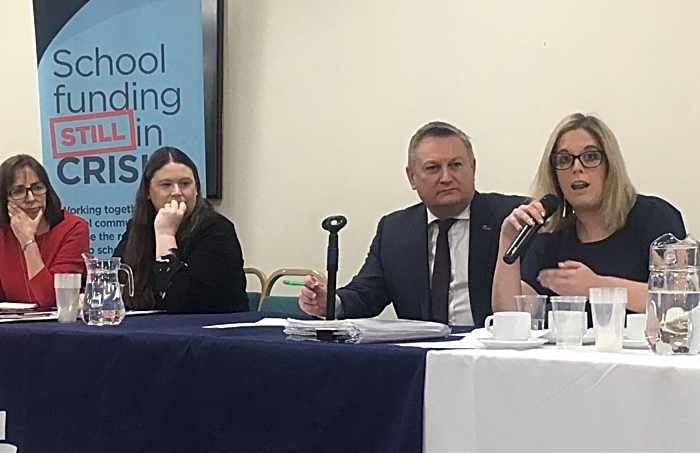
Crewe and Nantwich MP Laura Smith, a former teacher, has spoken up on the “urgent need” for extra education funding, writes Stephen Topping.
Ms Smith, who used to teach at a school in Winsford, was elected in 2017’s General Election after playing a leading role in the fairer schools funding for Cheshire East campaign.
Ms Smith, who worked at St Chad’s CE Primary School, is now Labour’s vice-chairman of the F40 Group – a cross-party organisation that represents boroughs that receive low funding for education, including both Cheshire East and Cheshire West.
She told a National Association for Head Teachers (NAHT) union summit in Crewe that it is important to be “honest about the reality” teachers are now working in.
Ms Smith said: “The new funding formula is based on historical averages, rather than on the real cost of running schools, and it is therefore still unfair.
“I believe that every single child matters, that everyone has something to offer, and that it is a tragedy for any child not to reach their full potential because of the failure to invest in their future.
“In today’s classrooms are tomorrow’s workforce and our future leaders – failure to invest in that is so short-sighted, and it is unforgivable.
“This issue has not gone away and we won’t stop until we get what our young people deserve.”
The mum-of-two told the summit schools in her constituency have seen real terms cuts of 6.5% since 2013-14.
This, Ms Smith added, has led to teaching assistants being cut from schools – increasing workloads on teaching staff.
She also claimed that provision for special educational needs (SEN) is now at crisis point – and that one of her own case workers was forced to do training on SEN law as a result.
Cllr Nicole Meardon, Cheshire West and Chester Council cabinet member for children and young people, also called on the Government to review spending on education at the NAHT summit.
She said: “Cheshire West, like Cheshire East, is one of the worst funded areas for education in the country.
“And it is not just about how those funds are distributed, it is about that not being big enough.
“It needs to change, it needs to meet the needs of how we all would expect our education system to look, and it needs to be based on evidence – what it costs to run a school, before we add any factors like deprivation.”
The summit was also told cuts to children’s services in local government are having a knock-on effect on schools which are expected to pick up additional work.
Cheshire East Council is due to approve its schools funding formula, while CWAC approved its schools funding formula for 2019-20 last November – with 0.5% of schools funding available to be ring-fenced for ‘high needs’ use under Government policy.
Schools across the country are expected to move onto the new national funding formula in 2021.
In the 2018 Annual Report on Education Spending in England, the Institute for Fiscal Studies (IFS) found that total school spending per pupil has fallen by eight per cent in real terms between 2009-10 and 2017-18.
The IFS says this was mainly due to a 55% cut to local authority spending on services, and cuts of more than 20% to sixth-form funding, while per pupil funding for primary and secondary schools is now 4% below its peak in 2015.
A spokesman at the Department for Education said: “Since 2017, we have given every local authority more money for every pupil in every school but we recognise the budgeting challenges schools face and that we are asking them to do more.
“In December, we announced £250 million additional funding for high needs over this year and the next, bringing the total high needs budget to over £6 billion this year, up from £5 billion in 2013.
“We’re supporting schools and headteachers to make the most of their budgets and reduce the over £10 billion they spend on non-staffing costs such as energy, water bills and materials.”





















Laura,
Tine for fair funding for schools. Less focussing on areas with high immigrant populations and English as a second language and fund each pupil fairly (ie the same amount). Cheshire East is a shambles and so it the Education Authority. Witness the disgraceful behavior at Weaver School where all the low paid staff (TSs, mid-days, dinner ladies etc.) get a pay cut while the teachers (great ‘socialists’ get a pay rise). It would also help if the Council did not prioritise its pension funding over pupils and staff (yet another increase in contributions to the sort of scheme abandoned years ago in the ‘real world’. Time to balance the ‘Tory Cuts’ argument with a fair deal for low paid and working class pupils in traditional areas
The public schools used by the great and the good need to be abolished or become state schools. All schools would then be funded better, as all children, including theirs would be affected.
A nice idea, but how would people make profits from running these schools? That’s not going to work.